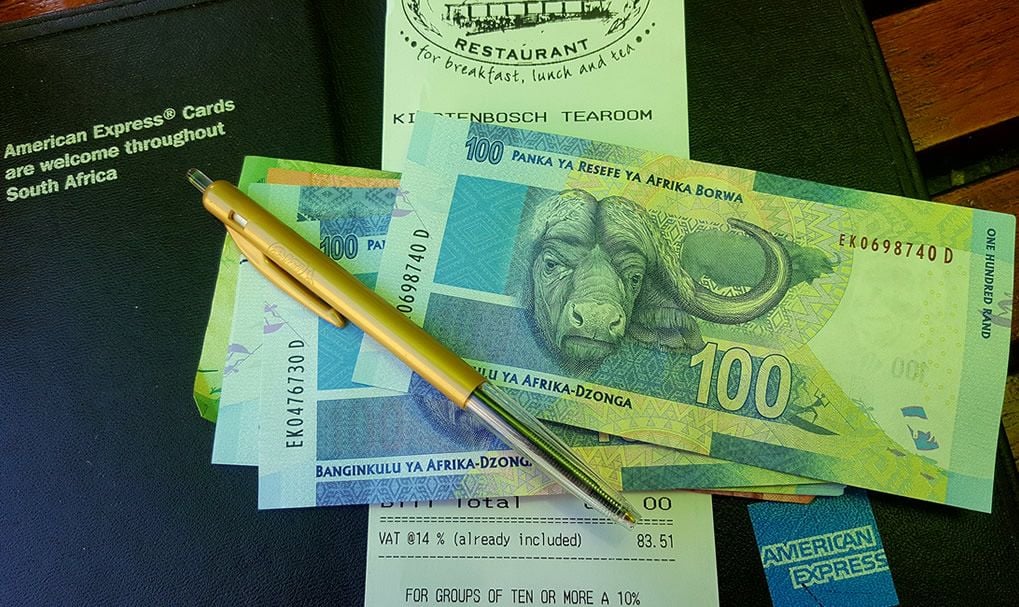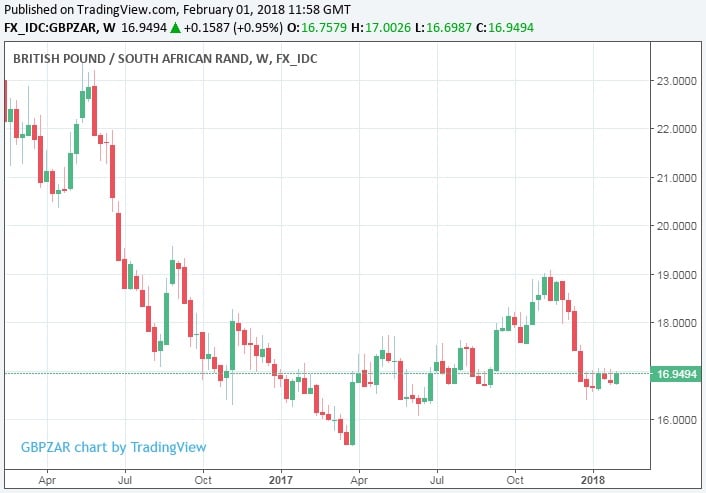South African Rand's Rally at Risk of Fading if Zuma Does Not Go Soon: Analysts
- Written by: James Skinner

A bellwether of how entrenched President Jacob Zuma is will come at the The State of The Nation address, while February's budget statement is a hard deadline for change.
The South African Rand threatened to advance on a new three year high against the US Dollar Thursday as speculation over a possible changeover at the top of government continues to support the currency.
However, strategists are now warning that volatility will increase as the February 21 budget statement approaches and that further gains are unlikely for the length of time that President Jacob Zuma remains in power.
“Renewed speculation around a change in the presidency spurred Rand gains yesterday. We doubt, however, that rumours will be enough to generate a break stronger on the Rand,“ says John Cairns, a currency economist at Rand Merchant Bank.
President Zuma’s continued occupancy of the Mahlamba Ndlopfu in Pretoria is seen as an impediment to economic and political reforms championed by deputy President Cyril Ramaphosa.
“At present speculation about Zuma standing down is supporting the Rand. However, the more the deadline approaches the more nervous investors might get,” says Alexandra Bechtel, an analyst at Commerzbank.
“We therefore expect to see a more volatile USD-ZAR the longer the political power struggle continues.”
South Africa’s parliament began working to formalise the process of removing a sitting president back in January, which prompted initial hopes the scandal-plagued Zuma could soon be removed.
The ANC’s leadership committee is also widely reported to have discussed the President’s position at a meeting Monday.
The USD/ZAR rate has dropped nearly 4% so far in 2018, which is the result of both US Dollar weakness as well as continued hopes that Jacob Zuma will soon be ousted and South Africa set on a pathway to further reform.
Despite continued strength in the South African currency the Pound-to-Rand rate has actually risen in 2018, gaining 1.87%, which is the result of heightened expectations that UK government is headed toward a diluted form of Brexit.
USD/ZAR was quoted 0.71% higher at 11.92 Thursday although it remains close to a three year low, while the Pound-to-Rand rate was marked 0.92% higher at 16.97.

Above: Pound-to-Rand rate shown at weekly intervals.
The Deadline for Change is Approaching
A key bellwether of just how entrenched the current President is will come on February 08, at the The State of The Nation address.
Should Ramaphosa deliver that speech then it could be seen as a sign that Zuma is relinquishing control to his successor.
However, February 21 is seen as a hard deadline for change as this will mark the unveiling of the latest South African budget plan.
The budget will be the final input required for Moody’s to determine whether it will downgrade South Africa’s local currency sovereign debt rating to “junk”.
Moody’s warned South Africa of a possible downgrade back in November and hinted that it would be watching December’s ANC leadership election closely.
“Growth has consistently underperformed expectations over recent years, undermining the government's efforts to meet its deficit targets....Potential growth also continues to be constrained by halting progress on structural reforms, including on the structure and regulation of the mining sector, on the governance of State Owned Enterprises, and on plans to reform the educational system to close the persistent skill gap,” the agency said.
Should South Africa suffer a downgrade, many institutional investors could be forced into selling their South African bonds, which would push government borrowing costs higher and put downward pressure on the Rand as foreign investors flee the country.
With Ramaphosa having won the ANC leadership election in December, South Africa has overcome the first hurdle to preventing a downgrade, by offering markets some hope of reform.
“There were increasing indications over the past weeks that Ramaphosa is already pulling the strings in the background and is taking important, far reaching decisions,” says Commerzbank’s Bechtel.
Deficit Progress and Reform is Key in 2018
A February 21 budget statement that sets out a credible plan for reducing a still-rising budget deficit will be key to determining whether the country is able to keep its investment grade rating.
Zuma’s continued presidency is seen as an obstacle to this as it was his ten year leadership that created the problems which have necessitated the reforms in the first place.
Beyond here, the South African Rand trajectory will be dictated by the pace of political and economic reform.
“In addition to appointing new members to the management of an important state owned energy provider Ramaphosa also made critical comments about extending the nuclear power sector in South Africa and took on important international appearances,” Bechtel adds.
So far, Cyril Ramaphosa has hit the ground running in his ANC party presidency by replacing the board of state power utility Eskom. Eskom, which is beset by cash-flow problems, is a critical issue for the South African state and Ramaphosa.
The South African Treasury is on the hook for as much as ZAR 350 billion (£21 billion) of Eskom’s debt, given government guarantees extended to the energy company in recent years, which means Eskom is also an issue for the ratings agencies.
Another top executive was suspended from the company this week, pending an investigation, after it emerged that he misled parliament during his testimony on the company's financial health.
Advertisement
Get up to 5% more foreign exchange by using a specialist provider to get closer to the real market rate and avoid the gaping spreads charged by your bank when providing currency. Learn more here.




